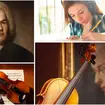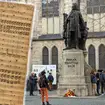Steven Isserlis Masterclass: Bach Cello Suites
“You could be having more fun with the music – you look a little stressed". It’s a fair comment. But when you’ve just played the Prelude from Bach’s Cello Suite No.1 to the man whose award-winning recording of the complete Suites won universal praise, a little stress is understandable. I’m also very nervous and hugely excited – let’s face it, it’s not every day a keen but very amateur musician gets to have a masterclass with Britain’s most acclaimed cellist, Steven Isserlis.
"You shouldn’t be stressed – not because of me," says Steven as I agree that I might be feeling a bit of pressure.
"Now, what do I think about your performance? It’s good you know it from memory, but don’t look down so much. I spend so much of my life with the cello that if I looked down at this fingerboard the whole time I’d get very bored – we’re in a nice new hall so look up!"
The setting for our class is the main hall in London’s newest concert venue, Kings Place, and it certainly is wonderful. I’ve never played in a room with such a good acoustic and as soon as I begin to look up and play out to the, thankfully, imaginary audience my sound immediately opens up.
"OK, good, your sound is more,"says Steven. "Now, what’s happened here musically so far?"
After a few minutes’ discussion about the various chords that the music has passed through we manage to ascertain not only that Bach is establishing the tonic key but also that I’ve left all my music theory behind me at university.
"I’m going to have to do a bit of work on that when I get home," I suggest sheepishly.
"Absolutely," says Steven enthusiastically. "You have to. Understanding what keys you’re moving through is like understanding the plot of a novel: each key is a different character and has its own relationship with the home key – the meaning of the music is expressed through the harmonies."
I listen as Steven plays the opening of the piece – it sounds fantastic, the music gently and lyrically unfolding under his fingers.
"You see, here’s a question, an answer, an arrival," he says as he plays. "I don’t feel the story from you. I want to hear a little more of the question as it clashes in the third bar."
I begin once again and am rewarded for my efforts with an approving nod from Steven. Now that I’m beginning to think more harmonically Steven presses me to think more rhythmically, too.
"At the moment your notes are too equal," he explains. "Music should never be static. Here, the first beat is coming from the first note and points backward, while the second half of the bar points forward. The first note is the most important of the first two beats so you must make that more important than the rest."
The note we’re discussing is an open G string that acts as a pedal note (underlying sustained note) that should ring throughout the bar. I use more of my bow on the all-important first note as instructed and continue playing, trying my hardest to tell a story as I move through the piece.
Although Bach’s Cello Suites are abstract music, Steven has, over the years, developed his own “personal feeling” about the works which hints at a story behind each suite. He has long believed that the Fifth and Sixth Suites are musical depictions of the Crucifixion and Resurrection respectively, and more recently that the remaining four suites also have Christian references hidden within them.
However, he’s at pains to point out that it’s just an idea and that even he is not totally convinced by his arguments; he’d never twist the way he plays in order to fit a particular "story" – the music always comes first. He’s obviously been thinking about and preparing the works for years, which is why he says he didn’t record them until recently.
"I learnt the Fourth and Sixth Suites much later than the rest," he says. "The Sixth I didn’t think I was ever going to learn, but one summer I got obsessed with it and actually dared to programme it and it was terrifying."
I find it incredible that he still has nerves when it comes to performing the Suites but he assures me he does.
"I hardly every play them now. I performed them before I recorded them, then thought, 'Great, I don’t have to do them again'! It’s funny; I always got most nervous with the Sixth and yet that’s the one people always seem to like the most. I find them terrifying to perform, but it’s my favourite music as well."
Part of Steven’s intense preparation consisted of consulting four different manuscripts, two from Bach’s lifetime – by his wife Anna Magdalena and the cantor and organist Johann Peter Kellner – and two from the latter part of the 18th century; unfortunately there is no surviving manuscript in Bach’s own hand.
The edited edition I’m using is an old one and although it seemed to serve me well 12 years ago Steven suggests I get the more up-to-date Bärenreiter edition which contains all four manuscripts plus a completely clean version of the Suites onto which you can add your own marks.
"With your copy it’s like talking to a vicar," he says, implying that it has been diluted by passing through various editors’ hands, going on to say of the manuscripts themselves,
"Why do that when you could be talking to God – or almost, you could be talking to Mrs God, Anna Magadalena!"
As I play again, Steven urges me to reveal a greater depth of expression.
"Happy, sad, hopeful, surprise,” he says. “It has to breathe – it has commas, colons and semi-colons."
As Classic FM magazine’s sub-editor, I should know all about these things, but putting them into music is much harder than tapping them out on a keyboard.
"Better," Steven cries over the top of my playing. "It’s all just growing and growing towards this blaze of light at the end. Now, smile when you come back to the tonic, and there’s a breath there – I’m not sure if it’s as much as a semi-colon… That was good, I felt something of a smile. I saw and heard something of a smile!"
Suddenly, I realise that I’m no longer nervous, I’m just having fun with the music.


























